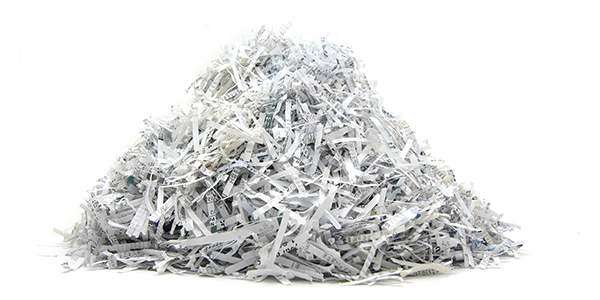Why Should I Shred My Documents?
That question can be answered in two words: Identity Theft.
The number of security issues continues to rise and is a critical concern for businesses and individuals. Securing private information and disposing of it safely has never been more important.
Financial documents may contain a wealth of data that criminals could use. These records may include confidential information. Examples include bank account numbers, credit card numbers, birth dates, Social Security numbers, and insurance policy numbers.
To protect yourself from identity theft, it is important to shred all documents containing Personally Identifiable Information. This includes information about yourself and your family. Document destruction is one of the simplest ways to stay secure.
If you think putting off cleaning closets and file cabinets may be too much work, ask yourself, “What would happen if someone stole my identity?” What would happen if I lost all my documents? You’d never be able to recover from those situations—but with some advance planning, they can be avoided.
What Documents to Keep and What to Toss?
If you have been keeping a hoard of receipts and other unnecessary documents, it’s time to let go. You don’t have to keep all your financial records forever. Getting rid of extra paper will help you feel better and be more productive.
Here’s a guide on what financial paperwork to keep – and for how long – and what to throw away:
Toss these items today
Most junk mail can go straight to the dumpster or recycling bin after being shredded. This includes solicitations for credit cards, home, life, and auto insurance plans, etc. The same goes for all of the marketing materials inside credit card and financial institution statements.
Keep for a month (or after reconciling bills and other financial statements)
Keep ATM and other receipts. It is advised to keep both the item and the receipt. This is unless you plan to exchange the item or need the document for a rebate or guarantee.
It is recommended to store these receipts for a month or two. Exceptions may apply to large purchases such as electronics, appliances, and computers. If you are self-employed, it is possible to subtract job-related expenses, such as food and equipment, from your taxes.
Toss after a year (and after your taxes have been filed)
Keep certain documents in your files for at least one year. These include end-of-year statements, whether they arrive in your email or through the mail. These documents are needed for taxes:- Cell phone, cable, telephone, internet, and other streaming service statements (unless deducted for work or home office-related expenses). – Brokerage statements. – Credit card bills. – Pay stubs. – Social Security statements. – Utility bills. – Statements from financial institutions.
Throw away after seven years
Think about this list as the items you should keep in files inside a cabinet for safekeeping for seven years or when you won’t need them any longer for tax purposes: Child-care records; flexible-spending account documentation; 401(k) and other retirement plan year-end statements; IRA contributions; purchase records for investments; records of charitable donations; records on houses you’ve sold; tax returns along with the documentation used to prepare them; correspondence from the IRS.
Keep these for as long as you own the asset
It’s important to keep some paperwork for as long as you own the item or property. These documents include titles, warranties, and insurance policies. Additionally, receipts for important purchases like art, technology, antiques, and jewelry should be kept. Lastly, receipts for home renovations or investments in your home or other property should also be kept.
Keep these items forever
Store documents you must keep for life in a fire-proof safe or safe-deposit box. Keep a second copy in a safe place outside your home or home office.
These documents include: – Adoption papers – Appraisals – Birth certificates – Citizenship documents – Custody agreements – Deeds – Divorce or annulment papers – Financial aid documents – A list of credit card numbers, bank and brokerage statements, insurance policies, passwords, and contact information, including email and phone numbers – List of important contacts, such as your lawyer, accountant, physician, and relatives – Military records – Powers of attorney – Stock certificates – Wills and living wills.
A word on safely tossing out documents
TEGFCU is devoted to safeguarding businesses’ and homeowners’ private data. Our Free Shred events offer an effortless, dependable, and peaceful way to remain safe. Shredding documents can be a daunting task. It doesn’t matter if you have a few or many papers. It’s best to work with a professional document destruction company. This will ensure that your confidential documents are disposed of securely.
We contract with Legal Shred to provide an industrial-grade shredder truck that securely shreds your documents right onsite. Because the destruction happens on-site, it reduces the risk of information falling into the wrong hands. Trucks equipped with giant shredders turn the documents and other media into small unrecognizable pieces right there, on the spot, before even driving away. In addition to ultimate convenience, it’s also extremely secure.
Source: Spring Cleaning: What documents to keep and what to toss by Jean Chatzky for SavvyMoney Daily.


